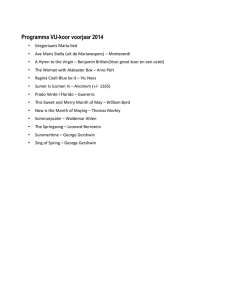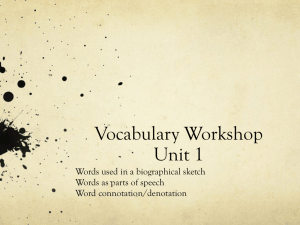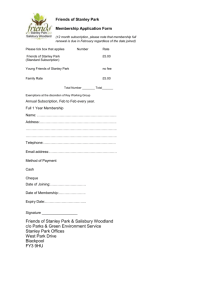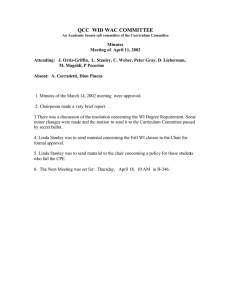Document 13446072
advertisement
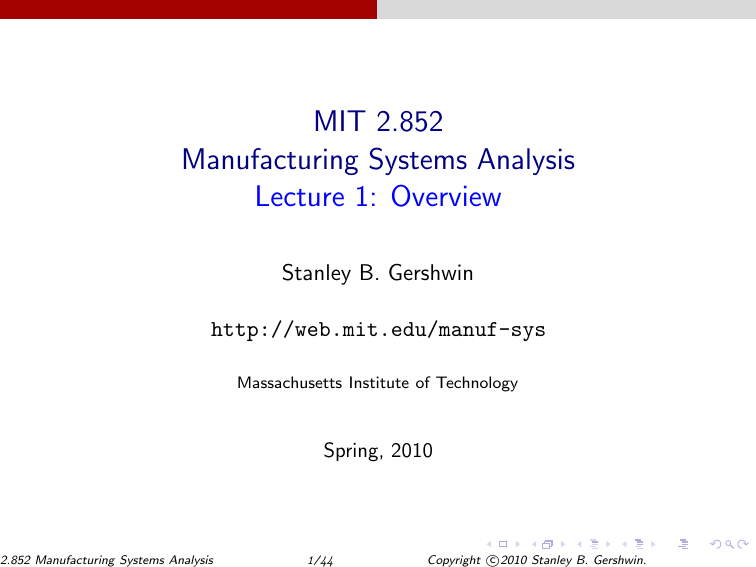
MIT 2.852 Manufacturing Systems Analysis Lecture 1: Overview Stanley B. Gershwin http://web.mit.edu/manuf-sys Massachusetts Institute of Technology Spring, 2010 2.852 Manufacturing Systems Analysis 1/44 c Copyright �2010 Stanley B. Gershwin. Books ◮ Required ◮ ◮ ◮ Manufacturing Systems Engineering (MSE) by Stanley B. Gershwin ... obtainable from author. Optional ◮ ◮ ◮ ◮ Factory Physics by Hopp and Spearman The Goal by Goldratt Stochastic Models of Manufacturing Systems by Buzacott and Shanthikumar Production Systems Engineering by Li and Meerkov 2.852 Manufacturing Systems Analysis 3/44 c Copyright �2010 Stanley B. Gershwin. Course Overview Goals ◮ To explain important measures of system performance. ◮ To show the importance of random, potentially disruptive events in factories. ◮ To give some intuition about behavior of these systems. ◮ To describe some current tools and methods. 2.852 Manufacturing Systems Analysis 4/44 c Copyright �2010 Stanley B. Gershwin. Problems ◮ Manufacturing systems engineering is not as well-developed as most other fields of engineering. ◮ Practitioners are encouraged to rely on gurus, slogans, and black boxes. ◮ There is a gap between theoreticians and practitioners. 2.852 Manufacturing Systems Analysis 5/44 c Copyright �2010 Stanley B. Gershwin. Problems ◮ The research literature does not always focus on real-world problems ◮ ... but practitioners are often unaware of what does exist. ◮ Terminology, notation, basic assumptions are not standardized. ◮ There is a separation of product, process, and system design. 2.852 Manufacturing Systems Analysis 6/44 c Copyright �2010 Stanley B. Gershwin. Problems ◮ Confusion about objectives: ◮ ◮ ◮ ◮ ◮ ◮ ◮ maximize capacity? minimize capacity variability? maximize capacity utilization? minimize lead time? minimize lead time variability? maximize profit? Systems issues are often studied last, if at all. 2.852 Manufacturing Systems Analysis 7/44 c Copyright �2010 Stanley B. Gershwin. Problems ◮ Manufacturing gets no respect. ◮ ◮ ◮ Systems not designed with engineering methods. Product designers and sales staff are not informed of manufacturing costs and constraints. Black box thinking. ◮ ◮ Factories not treated as systems to be analyzed and engineered. Simplistic ideas often used for management and design. 2.852 Manufacturing Systems Analysis 8/44 c Copyright �2010 Stanley B. Gershwin. Problems Reliable systems intuition is lacking. As a consequence, there is ... ◮ Management by software ◮ ◮ Managers buy software to make production decisions, rather than to aid in making decisions. Management by slogan ◮ Gurus provide simple solutions which sometimes work. Sometimes. 2.852 Manufacturing Systems Analysis 9/44 c Copyright �2010 Stanley B. Gershwin. Observation ◮ When a system is not well understood, rules proliferate. ◮ This is because rules are developed to regulate behavior. ◮ But the rules lead to unexpected, undesirable behavior. (Why?) ◮ New rules are developed to regulate the new behavior. ◮ Et cetera. 2.852 Manufacturing Systems Analysis 10/44 c Copyright �2010 Stanley B. Gershwin. Observation Example ◮ A factory starts with one rule: do the latest jobs first . ◮ Over time, more and more jobs are later and later. ◮ A new rule is added: treat the highest priority customers orders as though their due dates are two weeks earlier than they are. ◮ The low priority customers find other suppliers, but the factory is still late. 2.852 Manufacturing Systems Analysis 11/44 c Copyright �2010 Stanley B. Gershwin. Observation Example Why? ◮ There are significant setup times from part family to part family. If setup times are not considered, changeovers will occur too often, and waste capacity. ◮ Any rules that that do not consider setup times in this factory will perform poorly. 2.852 Manufacturing Systems Analysis 12/44 c Copyright �2010 Stanley B. Gershwin. Definitions ◮ Manufacturing: the transformation of material into something useful and portable. ◮ Manufacturing System: A manufacturing system is a set of machines, transportation elements, computers, storage buffers, people, and other items that are used together for manufacturing. These items are resources. 2.852 Manufacturing Systems Analysis 13/44 c Copyright �2010 Stanley B. Gershwin. Definitions ◮ Manufacturing System: ◮ Alternate terms: ◮ ◮ ◮ ◮ Factory Production system Fabrication facility Subsets of manufacturing systems, which are themselves systems, are sometimes called cells, work centers, or work stations . 2.852 Manufacturing Systems Analysis 14/44 c Copyright �2010 Stanley B. Gershwin. Basic Issues ◮ Increasingly, there are ... ◮ ◮ ◮ ◮ frequent new product introductions, and short product lifetimes, and short process lifetimes. Consequently, ... ◮ ◮ factories are built and rebuilt frequently, and there is not much time to tinker with a factory. It must be operational quickly. 2.852 Manufacturing Systems Analysis 15/44 c Copyright �2010 Stanley B. Gershwin. Basic Issues Consequent Needs ◮ Tools to predict performance of proposed factory design. ◮ Tools for optimal real-time management (control) of factories. ◮ Manufacturing Systems Engineering professionals who understand factories as complex systems. 2.852 Manufacturing Systems Analysis 16/44 c Copyright �2010 Stanley B. Gershwin. Basic Issues Quantity, Quality and Variability ◮ Quantity – how much and when. ◮ Quality – how well. In this course, we emphasize quantity. General Statement: Variability is the enemy of manufacturing. General Statement: Know your enemy! 2.852 Manufacturing Systems Analysis 17/44 c Copyright �2010 Stanley B. Gershwin. Basic Issues More Definitions ◮ Make to Stock (Off the Shelf): ◮ ◮ ◮ items available when a customer arrives appropriate for large volumes, limited product variety, cheap raw materials Make to Order: ◮ ◮ production started only after order arrives appropriate for custom products, low volumes, expensive raw materials 2.852 Manufacturing Systems Analysis 18/44 c Copyright �2010 Stanley B. Gershwin. Basic Issues Conflicting Objectives ◮ Make to Stock: ◮ ◮ ◮ large finished goods inventories needed to prevent stockouts small finished goods inventories needed to keep costs low Make to Order: ◮ ◮ excess production capacity (low utilization) needed to allow early, reliable delivery promises minimal production capacity (high utilization) needed to to keep costs low 2.852 Manufacturing Systems Analysis 19/44 c Copyright �2010 Stanley B. Gershwin. Basic Issues Concepts ◮ Complexity: collections of things have properties that are non-obvious functions of the properties of the things collected. ◮ Non-synchronism (especially randomness) and its consequences: Factories do not run like clockwork. 2.852 Manufacturing Systems Analysis 20/44 c Copyright �2010 Stanley B. Gershwin. Basic Issues What is an Operation? Operator Machine Part Operation Consumable Part Waste Nothing happens until everything is present. 2.852 Manufacturing Systems Analysis 21/44 c Copyright �2010 Stanley B. Gershwin. Basic Issues Waiting Whatever does not arrive last must wait. ◮ Inventory: parts waiting. ◮ Underutilization: machines waiting. ◮ Idle work force: operators waiting. 2.852 Manufacturing Systems Analysis 22/44 c Copyright �2010 Stanley B. Gershwin. Basic Issues Causes of Poor Performance Operator Machine Part Operation Consumable Part Waste ◮ Reductions in the availability, or ... ◮ Variability in the availability ... ... of any one of these items causes waiting in the rest of them and reduces performance of the system. 2.852 Manufacturing Systems Analysis 23/44 c Copyright �2010 Stanley B. Gershwin. Kinds of Systems Flow shop ... or Flow line , Transfer line , or Production line. Machine Buffer Traditionally used for high volume, low variety production. What are the buffers for? 2.852 Manufacturing Systems Analysis 24/44 c Copyright �2010 Stanley B. Gershwin. Kinds of Systems Assembly system Assembly systems are trees, and may involve thousands of parts. 2.852 Manufacturing Systems Analysis 25/44 c Copyright �2010 Stanley B. Gershwin. Loops Closed loop (1a) Limited number of pallets or fixtures: Raw Part Input Empty Pallet Buffer Finished Part Output ◮ Pallets or fixtures travel in a closed loop. Routes are determined. The number of pallets in the loop is constant. ◮ Pallets or fixtures take up space and may be expensive. 2.852 Manufacturing Systems Analysis 26/44 c Copyright �2010 Stanley B. Gershwin. Loops Closed loop (1b) Limited number of tokens: Raw Part Input Empty Token Buffer Finished Part Output ◮ Tokens travel in a closed loop. Routes are determined. The number of pallets in the loop is constant. ◮ Tokens take up no space and cost nothing. What are the tokens for? 2.852 Manufacturing Systems Analysis 27/44 c Copyright �2010 Stanley B. Gershwin. Loops Reentrant (2) Type 1 M System with reentrant flow and two part types Type 1 M B41 1 B11 Type 2 Type 2 B51 B12 B32 B71 4 B31 B22 M B61 2 M 3 B21 Routes are determined. The number of parts in the loop varies. Semiconductor fabrication is highly reentrant. 2.852 Manufacturing Systems Analysis 28/44 c Copyright �2010 Stanley B. Gershwin. Loops Rework loop (3) inspection reject rework Routes are random. The number of parts in the loop varies. 2.852 Manufacturing Systems Analysis 29/44 c Copyright �2010 Stanley B. Gershwin. Kinds of Systems Job shop ◮ ◮ Machines not organized according to process flow. Often, machines grouped by department: ◮ ◮ ◮ mill department lathe department etc. ◮ Great variety of products. ◮ Different products follow different paths. ◮ Complex management. 2.852 Manufacturing Systems Analysis 30/44 c Copyright �2010 Stanley B. Gershwin. Two Issues ◮ Efficient design of systems; ◮ Efficient operation of systems after they are built. 2.852 Manufacturing Systems Analysis 31/44 c Copyright �2010 Stanley B. Gershwin. Time ◮ Most factory performance measures are about time. ◮ ◮ ◮ ◮ ◮ production rate: how much is made in a given time. lead time: how much time before delivery. cycle time: how much time a part spends in the factory. delivery reliability: how often a factory delivers on time. capital pay-back period: the time before the company get its investment back. 2.852 Manufacturing Systems Analysis 32/44 c Copyright �2010 Stanley B. Gershwin. Time ◮ Time appears in two forms: ◮ ◮ ◮ delay capacity utilization Every action has impact on both. 2.852 Manufacturing Systems Analysis 33/44 c Copyright �2010 Stanley B. Gershwin. Time Delay ◮ An operation that takes 10 minutes adds 10 minutes to the delay that ◮ ◮ a workpiece experiences while undergoing that operation; every other workpiece experiences that is waiting while the first is being processed. 2.852 Manufacturing Systems Analysis 34/44 c Copyright �2010 Stanley B. Gershwin. Time Capacity Utilization ◮ An operation that takes 10 minutes takes up 10 minutes of the available time of ◮ ◮ ◮ ◮ a machine, an operator, or other resources. Since there are a limited number of minutes of each resource available, there are a limited number of operations that can be done. 2.852 Manufacturing Systems Analysis 35/44 c Copyright �2010 Stanley B. Gershwin. Time More Definitions ◮ Operation Time: the time that a machine takes to do an operation. ◮ Production Rate: the average number of parts produced in a time unit. (Also called throughput. ) If nothing interesting ever happens (no failures, etc.), Production rate = 1 operation time ... but something interesting always happens. 2.852 Manufacturing Systems Analysis 36/44 c Copyright �2010 Stanley B. Gershwin. Time More Definitions ◮ Capacity: the maximum possible production rate of a manufacturing system, for systems that are making only one part type. ◮ ◮ ◮ Short term capacity: determined by the resources available right now. Long term capacity: determined by the average resource availability. Capacity is harder to define for systems making more than one part type. Since it is hard to define, it is very hard to calculate. 2.852 Manufacturing Systems Analysis 37/44 c Copyright �2010 Stanley B. Gershwin. Randomness, Variability, Uncertainty More Definitions ◮ Uncertainty: Incomplete knowledge. ◮ Variability: Change over time. ◮ Randomness: A specific kind of incomplete knowledge that can be quantified and for which there is a mathematical theory. 2.852 Manufacturing Systems Analysis 38/44 c Copyright �2010 Stanley B. Gershwin. Randomness, Variability, Uncertainty ◮ Factories are full of random events: ◮ ◮ ◮ ◮ ◮ machine failures changes in orders quality failures human variability The economic environment is uncertain ◮ ◮ ◮ demand variations supplier unreliability changes in costs and prices 2.852 Manufacturing Systems Analysis 39/44 c Copyright �2010 Stanley B. Gershwin. Randomness, Variability, Uncertainty Therefore, factories should be ◮ designed as reliably as possible, to minimize the creation of variability; ◮ designed with shock absorbers, to minimize the propagation of variability; ◮ operated in a way that minimizes the creation of variability; ◮ operated in a way that minimizes the propagation of variability. 2.852 Manufacturing Systems Analysis 40/44 c Copyright �2010 Stanley B. Gershwin. Randomness, Variability, Uncertainty ◮ Therefore, all engineers should know probability... ◮ ◮ especially manufacturing systems engineers . Probability is an important prerequisite for this course. 2.852 Manufacturing Systems Analysis 41/44 c Copyright �2010 Stanley B. Gershwin. The Course Mechanics ◮ Reading: Mainly Chapters 2–9 of MSE . (Chapter 9 up to 9.3.) ◮ Grading: project and class participation. ◮ Homework optional. 2.852 Manufacturing Systems Analysis 42/44 c Copyright �2010 Stanley B. Gershwin. . The Course Topics ◮ Probability ◮ ◮ ◮ ◮ Basics, Markov processes, queues, other examples. Transfer lines Models, exact analysis of small systems, approximations of large systems. Extensions of transfer line models ◮ Assembly/disassembly, loops, system optimization ◮ Real-time scheduling ◮ Quality/Quantity interactions ◮ New material 2.852 Manufacturing Systems Analysis 43/44 c Copyright �2010 Stanley B. Gershwin. The Course ◮ Emphasis on mathematical modeling and analysis. ◮ Emphasis on intuition. ◮ Comparison with 2.854: Narrower and deeper. 2.852 Manufacturing Systems Analysis 44/44 c Copyright �2010 Stanley B. Gershwin. MIT OpenCourseWare http://ocw.mit.edu 2.852 Manufacturing Systems Analysis Spring 2010 For information about citing these materials or our Terms of Use,visit: http://ocw.mit.edu/terms.
